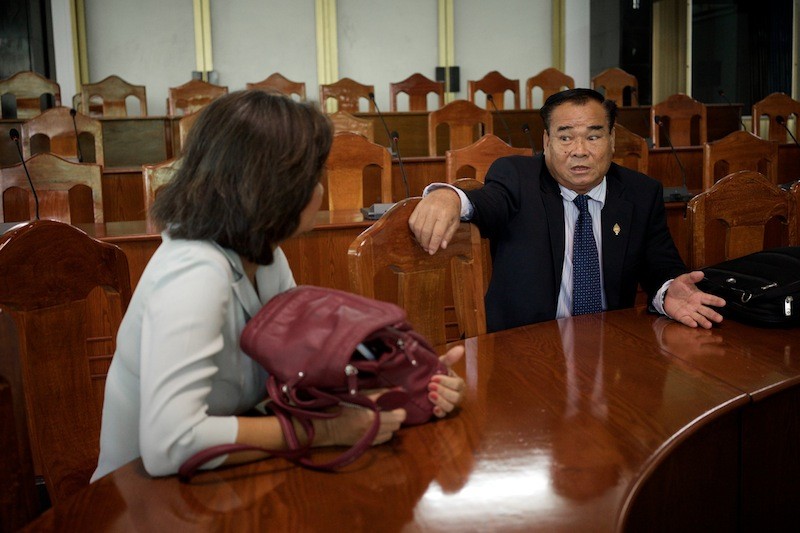The government’s Anti-Corruption Unit has been swamped of late. In recent weeks, it has launched an investigation into deputy opposition leader Kem Sokha’s finances, jailed a Foreign Affairs Ministry bureau chief and imprisoned the ambassador to South Korea.
The same cannot be said of the National Assembly’s opposition-led anti-corruption commission, which has mostly been silent since it was created in mid-2014 and touted as one of the CNRP’s major victories in a political deal it struck with the ruling party.

Yim Sovann, head of the opposition’s executive committee, was set to become head of the commission, a new tool to fight and expose government graft—an extension of a campaign against corruption started by opposition leader Sam Rainsy when he was finance minister more than two decades ago.
But the CNRP’s plan was thwarted, and the anti-corruption commission has so far been a flop by the party’s own admission.
The CPP rejected Mr. Sovann’s candidacy when it was put to a vote in parliament in August 2014. Intent on seeing other parts of the political deal move forward, mainly electoral reform, the CNRP quickly proposed another lawmaker to fill the spot—Phnom Penh representative Ho Vann.
Though a stalwart in Mr. Rainsy’s political movement, Mr. Vann was not the right man for the job, said Son Chhay, the opposition’s chief parliamentary whip.
“I think Ho Vann was not the party’s [first] choice,” Mr. Chhay said last week. “As you know, Yim Sovann was the one originally appointed, but the CPP rejected Yim Sovann, and just to keep the chair we put Ho Vann, who is a very busy person; he is in charge of the party in Phnom Penh.”
While Mr. Chhay placed part of the blame on the CPP for voting against Mr. Sovann in the first place, and its ensuing efforts to suppress the opposition inside and outside of parliament, he said the CNRP also needed to take responsibility for the nine-member commission’s inactivity.
“It’s not just one or two committee chairs to be blamed. I think you have to look at the whole political atmosphere in general,” he said. “But we are not going to give this as an excuse not to do anything.”
Mr. Chhay said the party had a broad plan to become more active in the National Assembly and to make greater use of the five parliamentary commissions it chairs, which have the power to investigate complaints from citizens and summon government ministers. He said the party would also work on revitalizing the anti-corruption commission.
“We are going to help him,” he said of Mr. Vann. “We will help him to be more active; we will make some suggestions to him about who [is] to be invited and what questions to raise and so on.”
“To get this committee to be created was a big kind of effort, so we don’t want to leave it in a corner by not making use of it,” he added.
Mr. Sovann, who also serves as a CNRP spokesman, said he and other party leaders had many ideas for the commission, mainly pushing for stronger anti-corruption legislation.
“This is the plan of the party, of the CNRP: first the amendment of the existing Anti-Corruption Law, the [creation of an] access to information law, the witness protection law, judiciary reform and [reforming] the audit authority, and ensure the procurement document law is fully and strictly enforced and any breach of this law should not be tolerated,” Mr. Sovann said last week.
Asked about Mr. Vann’s apparent lack of progress in pushing this agenda forward, Mr. Sovann said the party’s policy was to “give full authority to the chairman of the commission, so they can do the job independently.”
“From my point of view, we need to do more,” he said. “But any difficulties, any problems, please ask the commission chairman.”
Mr. Vann, who was hesitant to make the commission’s work public given the sensitivity of certain cases, said his commission simply did not have the authority to properly investigate or expose corruption and was in desperate need of legislation that would empower members to do their job.
“We have worked under limitations, meaning that we are just working under the National Assembly limits and we are entitled to review and examine the complaints,” Mr. Vann said, adding that the commission had received about 50 corruption complaints since its inception.
Mr. Vann said Health Minister Mam Bunheng was the only minister who had been questioned by the commission and that it often had to hand complaints to the Anti-Corruption Unit for further investigation.
“For some cases, we do not have enough documents to use as proof for inviting any ministers to come to our commission for questioning because a corruption case involves criminal offenses, so we need to be careful in inviting them for questioning,” he said.
The lack of crucial anti-corruption legislation, such as the laws outlined by Mr. Sovann, was also preventing the commission from being more effective, Mr. Vann said.
“We have faced many difficulties,” he said. “In brief, there are no laws giving us full power, and we do not have enough power to do work like the Anti-Corruption Unit because the law doesn’t give us power to conduct investigations.”
But even with these obstacles, the commission could be doing much more, said Transparency International Cambodia director Preap Kol, who attributed its poor showing both to the prevailing political climate and its own leadership.
“I think this commission should and could be more active and proactive in following up on well-known anti-corruption cases or complaints to ensure implicated/corrupt people are held accountable,” he said in an email.
“Additionally, the commission could propose amendments to the existing anti-corruption law and proactively propose provisions on nepotism or conflict of interest among other aspects.”